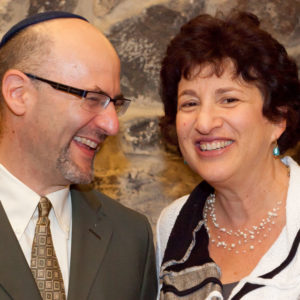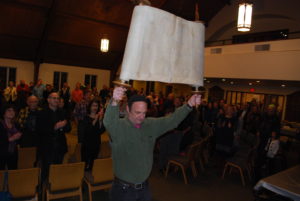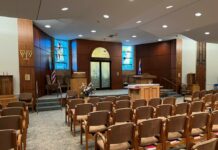Congregation Beth Israel, a Reconstructionist synagogue in Media, has focused on social justice in its community activity for years.
But in 2020 after the murder of George Floyd in Minneapolis, the temple clarified its mission to emphasize anti-racism.
Beth Israel hosted an anti-racism summit in January; this spring, summer and fall, it’s holding a book study on an Ibram X. Kendi title; throughout this year, synagogue leaders are starting an adult education class on anti-racism. And big picture, they are examining their policies and researching which organizations in the community they can support.
“We’ve been working hard on anti-racism,” said Emma Lefkowitz, the president of Beth Israel’s board of directors.
Lefkowitz and Rabbi Linda Potemken have an activist-oriented congregant base of about 160 families; and the leaders want to motivate members to target their activism toward anti-racist efforts.
They say it’s in line with the Jewish value of tikkun olam, or healing the world.
“What is the Jewish mission?” Potemken said. “To walk in the world in the image of God.”
At the small synagogue, members are faithful, but they are not strict about attending Shabbat services. Potemken said 15 people on Zoom is a decent turnout.
But there’s no shortage of Beth Israel congregants who want to help with social justice, according to the rabbi. And this latest development is just a continuation of Beth Israel’s existing mission. In the past, members have focused their activism on food banks, soup kitchens and on helping new moms get supplies for their children.
Almost two decades ago, Potemken started a program to partner with communities down the road, like Chester and Marcus Hook, on social action efforts, a program that continues to this day.
“Beth Israel members tend to be passionate and they tend to be fighters,” Lefkowitz said. “Everybody has something they care deeply about, and they want to make change.”

Potemken is in her 25th year as rabbi at Beth Israel. She joined the temple after leading a service and teaching a class there during rabbinical school. She was drawn to the institution’s “warm, down-to-Earth family feel,” she said.
The rabbi said she had the good fortune to become the spiritual leader at Beth Israel right after it bought a new building. At that point, she started building the community’s schedule and congregation.
Since Beth Israel members only met on Friday nights, Potemken added a Saturday service and Torah study. She also opened a Shabbat dinner on Friday nights and a Sabbath lunch on Saturdays.
“She saw it as her task to expand the programming,” Lefkowitz said. “It was a change that was quite welcome.”
Larry Hamermesh joined Beth Israel with his wife 15 years ago. He said they left their old synagogue in Wilmington, Delaware, where they still live, because of Potemken. They got to know her through mutual friends and liked her.
“She’s very approachable, enthusiastic and supportive of congregational participation,” Hamermesh said.
After Potemken came on, Beth Israel grew for about 10 years before leveling off, and then declining a little. But while its membership is small, it is also steady, according to synagogue leaders.
To help Potemken lead it, the temple hired Rabbi Nathan Martin six years ago. Potemken wanted to reduce her role so she could have more time to breathe. The decision was uncomfortable at first, Potemken said, but after Martin arrived, she grew to love having a rabbinic partner.
“To have a thought partner was amazing,” she said. “Communities resist change. We’ve benefited from it. Two rabbinic voices, styles and energies.”

After the pandemic broke out, Martin led the pivot to virtual services. The new rabbi also motivated synagogue leaders to start the process of adding solar panels to the building in the coming years.
Potemken made it clear that she sees Martin as her successor when she eventually retires.
“When I retire, it won’t be the shock that most communities get,” she said.
Lefkowitz thinks the synagogue can be as sustainable as Martin’s solar panels. A new member joined just last week, she said. Plus, at hybrid services, people are joining from as far as Vermont, Oregon and Florida.
“When you come into the building, you feel like you’re coming into a community you’ve been in your whole life,” she said. JE






